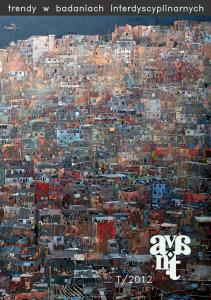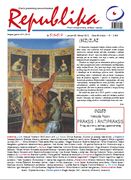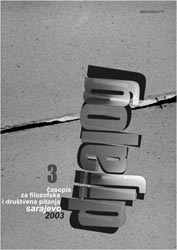
We kindly inform you that, as long as the subject affiliation of our 300.000+ articles is in progress, you might get unsufficient or no results on your third level or second level search. In this case, please broaden your search criteria.


Antonin Artaud – tko je to? Ime, znak ili događaj? Imenovanje je znak sudbine: nomen est omen. Znak najradikalnijega obrata umjetnosti i života u razdoblju povijesne avangarde 20. stoljeća zacijelo je Artaudov projekt prevladavanja reprezentacijskoga kazališta jezika i govora. Povratak fizičkoj ekspresiji tijela čini se da je alternativa vladavini psihološke drame subjekta. Kada se znak znamenuje događajem insceniranja umjetnosti kao života, tada se istodobno radikalno mijenja perspektiva ne samo umjetnosti nego ponajprije onog što se razumije životom. Posrijedi je kraj vitalistički shvaćenoga života i kraj biologijskoga pozitivizma života.
More...
Motiv domene oblasti “ove strane hermeneutike” središnji je za Lacana, za koga psihoanaliza nije hermeneutika, posebno ne naročito duboka. Psihoanaliza se bavi subjektom koji je suvremenik nastanku modernog Realnog koje se pojavljuje onda kad se značenje evakuira iz stvarnosti: ne samo znanstveno realno do kojeg dolazimo putem matematičkih formula, nego također, od Sartrea do Schellinga, proto-ontološka praznina inercije ”pukog realnog”, uskraćenog za svaki smisao. Za Lacana tako nema potrebe za psihoanalitičku hermeneutiku – religija prilično dobro obavlja taj posao.
More...
“Jezik je kuća bitka” - kaže Heidegger, jezik je neodvojiv od bića. Svijet postoji samo onako kako postoji u jeziku, izvan jezika kao da nestaje. “I Bog mora progovoriti, biti nešto nego ništa” - određuje Heidegger, i pita zašto nešto prije nego ništa? Budući da je jezik nešto, budući da je nedostatak jezika nešto. Zapravo, Heidegger slijedi logike komunikacije, „jer čini mi se da je ljudsko moja cjelovita nesposobnost biti kao Bog” (Kordić, 191). Za njega čovjek treba “komunicirati, razmišljati procesualne spojeve u odnosu objektivne stvarnosti”, jer je prazan i necjelovit. Tu je prostorna razlika u odnosu između bića i postojanja to da nema razlike.
More...
Pogrešivost autoriteta zabašuruje se apsolutnom upotrebom riječi. Budući da se ne uzimaju u obzir ni kolektivna tijela ni osobe koje izdaju “nalog”, to se on kao ugovorna utvrda uklapa u totalitarnu ustanovu bez racionalnog pitanja o pravu onih koji sebi dosuđuju karizmu vođe. Postiđena teologija sljepljuje se sa svjetovnom bestidnošć u… Christian Schütze objavio je satiru Ukalupljeni pozdravni govor.
More...
The author's contemplations on the relationship between power and human dignity are based on the intrapsychic sphere of experiencing power efforts and the ambivalence of human needs. Power is understood as a prerequisite, capability and part of human action associated with the way of self-confirmation in time-space which limits the life of an individual. It is precisely the way of self-confirmation in both vertical and horizontal incorporation into human relations as a precondition for creating respect for the self that assigns a value dimension to power manifestations. The world order and humanization of power are evidently impossible without the .order. which a man can create inside himself within the process of spiritual selfcreation of a personality on the principle of conscience. Thus human dignity also becomes a power, strength of spirit, which provides an individual with the capability to decide competently about the self and others.
More...
SRŽ KRISHNAMURTIJEVOG učenja je sadr`an u govoru iz 1929. kada je rekao: “Istina je zemlja bespuća. Čovjek do nje ne može doprijeti putem bilo koje organizacije, putem bilo kojeg vjerovanja, putem bilo koje dogme, sve}enika ili rituala, niti putem bilo koje filozofske spoznaje ili psihološke tehnike. On je mora pronaći u zrcalu odnosa, u razumijevanju sadržaja svog vlastitog uma, kroz promatranje, a ne kroz intelektualnu analizu ili introspektivnu disekciju.
More...
Jeste li ikada sjedili vrlo mirno, bez ikakvog pokreta? Pokušajte, sjednite zaista mirno, s uspravljenim leđima i zapažajte što se događa u vašem umu. Ne pokušavajte ga kontrolirati, ne recite kako bi to bilo skakanje s jedne misli na drugu, s jednog interesa na drugi, već upravo budite uvjereni kako vaš um skače. Ne činite ništa u vezi toga već promatrajte s obale rijeku kako je voda zapljuskuje. U rijeci koja teče je mnogo toga – ribe, lišće, mrtve životinje - ali to je uvijek živo, u pokretu i vaš um je takav. On je uvijek neumoran, leti s jedne stvari na drugu poput leptira.
More...
Krishnamurti's Works Translated into Croatian Language
More...


The paper has two sections of crucial significance for the recent history of Bosnia and Herzegovina. The first analyzes the period beginning with the end of World War II, when Bosnia and Herzegovina emerged within the National Liberation Movement as a historical political subject. This period, marked by a socialist order and general, primarily material and economic progress, lasted until the beginning of the last decade of the twentieth century, when SFRY vanished from the political scene as the Communist social system collapsed in Eastern and South-Eastern Europe. The new period was characterized by war in the countries of former Yugoslavia, in which Bosnia and Herzegovina was subjected to Greater Serbian aggression, genocide and ethnic cleansing of the Muslims and Croats, in which the ideology and policies of Greater Croatian aspirations were also expressed in deeds. The war that broke out in 1992 was brought to an end by US dictate with the Dayton Accord, initialled on 21 November 1995. Historical studies still lack the essential original, authentic documents with which to construct a reliable, solidly grounded and objective assessment of this period, which is extending into the twenty-first century with still unresolved questions concerning the position of Bosnia and Herzegovina.
More...
Paul Ricoeur addresses the two meanings of the meta-category of alterity: our own body, or the flesh, and the otherness of the other self. He accords great credit to Husserl for his analysis of the first face of passivity-alterity, despite the a priori constraints on his achievement set by transcendental phenomenology. With this thinker, we find the outline of a highly promising ontology of the flesh, and which explicitly incorporates hermeneutic phenomenology into the ontology of alterity. However, an ontology of this kind – which would equally take account of the inner connectedness of the self with embodiment and its openness to the world – can no longer be constituted as a phenomenology, as a philosophy of consciousness or representation, as shown by the great heritage of reflections dedicated to the body, from Maine de Biran to Heidegger. Just as the first dimension of alterity is opened by Husserl’s differentiation between Leib and Körper, so this second dimension is based on the difference between the ego, which poses itself, and the self, which knows and recognizes itself only through the affections with which it is struck by the Other. This specific passivity of the self is most consistently and radically expressed by E. Lavinas. However, his work contests the identity of the Same, making it the polar opposite of the otherness of the Other. The ineradicable distance from the Other is the expression of the acceptance of a certain philosophy of totality that cannot accept the new dialectic of the Same and the Other in which the Other would not merely be the opposing side of the Same but would belong to the inner constitution of its meaning. The postulate for this dialectic or dialogic is the internalization of the difference between two kinds of identity, identity ipse and identity idem, which Levinas’ thought is unable to do.
More...
Bosnia and Herzegovina possesses considerable underused development potential, including marked natural and historical advantages in certain sectors and branches of the economy, particularly agricultural production. These could be highly attractive for loans by both domestic and foreign creditors with available funds. Increased capital investment in the BiH economy would accelerate its revival and expansion, which would also be in the interests of the economies of other countries both in Europe and beyond. Economic prosperity in BiH would increase employment, encourage and accelerate the return of refugees, and halt the further brain drain of the young and qualified. This would reinforce the subjective factor of progress, accelerate socio-economic transition, and enhance productivity, general welfare and the standard of living. Within economic policy, the monetary and credit component has a major stimulative role, provided it is adequately regulated. A more rapid growth in money supply from simultaneous growth in domestic product would contribute to stable development in BiH. At the same time, however, it would have to be promptly compensated for by increased supply of new securities. This would require the additional volume of money and credit supply to be explicitly directed to the production of goods and services for which there is insufficient market demand, which in turn would require greater and better planned activity on the part of commercial banks, with the Central Bank of Bosnia and Herzegovina having a regulatory function.
More...
The Primacy of Perception and its Philosophical Consequences is an address given by Merleau-Ponty to the Société française de philosophie following the publication of his major work, The Phenomenology of Perception. The major goal of the book is presented as an attempt to define a method of getting closer to reality as we live and experience it at the level of perception. This reality is a privileged realm of experience – to which only a phenomenology can give us access – because it is there that the world constantly originates. The “primacy of perception” formulates a central thesis of the book. What is meant by the phrase is that the experience of perception is our presence at the moment when things, truths, values are constituted for us. It is a challenging thesis suggested by the insight that all consciousness is perceptual, even the consciousness of ourselves. Phenomenology thus becomes the phenomenology of perception.
More...

The author considers the real state of affairs and the potential for the protection and advancement of human rights in BiH and the role of parliament in this. The human rights situation in this country is disastrous and a disgrace. Not only are the fundamental rights of the individual and of ethnic and religious communities violated: in many cases what is at work is legalized discrimination and apartheid. In Bosnia and Herzegovina we are seeing the grave consequences of the war of aggression and the Dayton structure of the State with its artificial ethnonational divisions and injustices, which must be radically altered by the adoption of a new Constitution appropriate to the country’s historical identity and the civilized standards of a free, sovereign, democratic state in which both individual and group-differentiated human and civil rights would be guaranteed.
More...
Damir Barbarić is one of the most important Croatian philosophers today. In this book he seeks to set out different possibilities for an innovative approach to reading the classics of philosophy. This collection of essays covers a wide range of topics, from the Greeks to contemporary issues of media-influenced aesthetics. Some of today’s philosophical problems are traced back to some paradign theories of western thinking, in so doing, Barbarić is trying to avoid the traditional grouping of philosophers, and succeeds in making some well known concepts sound different and contemporary. Professor Barbarić’s work as a whole is strongly influenced by phenomenology and hermeneutics. He himself calls his thinking a “thinking of transition” or “transitional thinking”, which reminds us of Heidegger and Gadamer, of their efforts to understand “thinking” as an exposure to a pure event, a place where “transition” itself occurs.
More...
In this work the author undertakes a reading of Derrida’s reading of Husserl – specifically, a complex reading of Husserl’s famous text “Origin of Geometry,” written in 1936, which has not been sufficiently addressed by phenomenology, and which is Husserl’s last attempt, by examining the origin of geometry, “of which the object is defined as the spatiality of a natural object,” and problematizing a hierarchy of ontology that is outlined a priori, which offers the possibility of “constructing a third form of universal view,” to direct transcendental phenomenological philosophy towards the realization of its historical mission. This mission consists primarily in the quest for meaning, which has been wholly lost in the tradition of the mathematized sciences of the modern age.
More...
In the world of nation-states, it is nomination rather than sociological content that designates the political status, rights and obligations of the group. A group’s position within the nation-state system, and the legitimacy of its political claims, essentially depend on whether it is denoted as a nation or as an ethnic group: the right to its own state is regarded as legitimate if claimed by sociological entities labelled as “nations,” but illegitimate if claimed by those labelled as “ethnic groups.” There are, however, no objective sociological criteria for distinguishing between “nations” and “ethnic groups;” the very same group – or, indeed, any other sociological entity – can acquire nationhood by claiming the right to possess its own state, provided that this claim is recognized by other members of the nation-state system. Thus, paradoxically and self-referentially, nomination depends on recognition and recognition depends on nomination: successful lobbying for recognition is what legitimizes claims to nationhood and brings about the nomination of a group as a nation. In the case of Bosnia, the very nomination of portions of its population in terms of nationhood in effect prompted them to claim their own nation-states and opt to partition the country, while at the same time promoting its incompatibility with the system of nation-states. The consequences are all too obvious.
More...